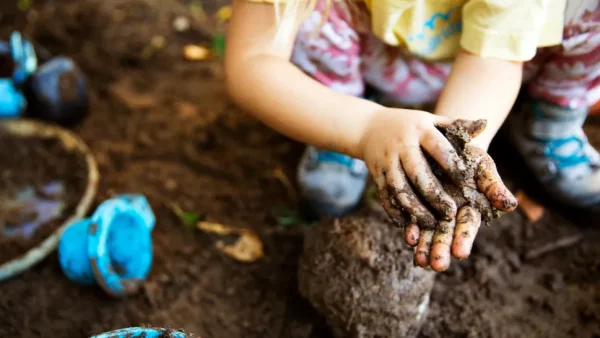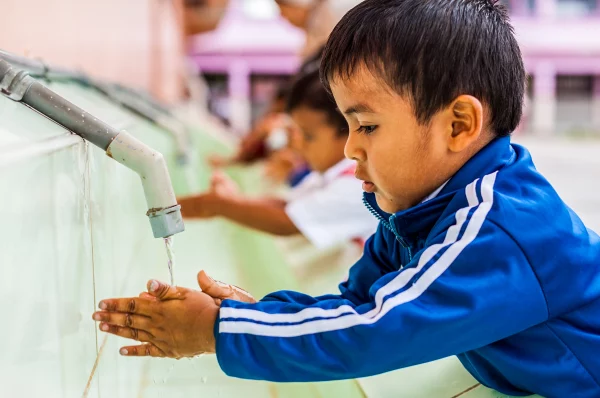The question of whether allowing children to play with dirt is beneficial for their health has been attracting the attention of many parents. Recent studies have shown that dirt, often considered a cause of disease, actually plays an important role in the development of children’s immune systems.
According to the “hygiene hypothesis” proposed by epidemiologist David Strachan in 1989, exposure to bacteria from the natural environment, including dirt, helps stimulate children’s immune systems to distinguish between beneficial and harmful bacteria. A 2023 study from the U.S. National Institute of Environmental Health Sciences states: “Children exposed to the natural environment during their early years have a 30% lower risk of developing allergic and autoimmune diseases compared to those living in overly sanitized environments.”
Scientists at the University of Helsinki (Finland) also confirm that children who play outdoors for at least 30 minutes each day show a significant increase in beneficial bacteria in their gut, thereby improving their ability to prevent diseases (Source: University of Helsinki).

Dr. Maria Jenkins, an immunologist at the University of Cambridge, believes that keeping the living environment too clean can sometimes be counterproductive. She shares: “Children’s immune systems need to be trained through exposure to harmless bacteria in the environment. This is the natural way for the body to learn how to protect itself.”
However, the common misconception that dirt is always harmful has led many parents to limit their children’s exposure to nature. This can result in underdeveloped immune systems in children. Professor James Collins, an immunology expert at the University of California, emphasizes:
“Overprotecting your child, such as not allowing them to play outside or frequently using strong disinfectants, can reduce their ability to fight off diseases.”
While dirt undoubtedly has many benefits, parents must also be cautious of areas that are polluted or contain harmful chemicals. Experts recommend that children wash their hands with soap and clean water after playing outdoors, especially before meals, to reduce the risk of exposure to harmful bacteria.

The “back to nature” movement is becoming increasingly popular worldwide. A prime example is the Green School in Bali (Indonesia), where children are encouraged to learn and play in a natural environment. According to statistics from the school, the incidence of allergies among children there is significantly lower compared to traditional schools (Source: Green School, Bali).
“Not all bacteria are bad. Many types of bacteria in dirt actually help the immune system develop in a balanced way and protect children from autoimmune diseases in the future,” Professor Jenkins adds.


HPX24h > Health > Playing with Dirt: The Surprising Secret to Children’s Health and Immune System
Top Reads from This Category
Health
Step-by-Step Guide to Safely Relieving Bloating in Children
Health
Heart and Brain Health: How to Effectively Prevent Cognitive Decline?
Health
Why You Shouldn’t Skip a Protein-Rich Breakfast
Health
Exploring How Microplastics Enter the Body and Affect Health
Health
Unlocking the Mystery: How the Brain Controls Body Weight
Health
5 Tips to Help You Overcome Smartphone Addiction
Health
Can Gray Hair Be Restored? What Science Says About Regaining Natural Hair Color
Discover New Topics
Parenting Tips
Why Your Child Might Be Coughing Disruptively During Sleep?
Science
Gold in the Human Body: A Scientific Look at the ‘Hidden Gold’ Inside You
Parenting Tips
How to Talk to Your Child About Divorce: Helpful Tips for Parents
Science
Robot Walker: A Breakthrough in Helping Stroke Survivors Regain Natural Walking
Healthy Eating
Health is ‘Declining’ Due to Processed Foods: How to Turn the Tide
Healthy Eating
Why Do We Crave Sweets? A Scientific Perspective on Food Cravings
Space
Jupiter-Like Planets: The Key to Unlocking Earth-Like Worlds
Fitness
Yoga: The Key to Physical and Mental Balance
Healthy Eating
Longevity Diet: The Key to Nutrition That Helps Extend Lifespan
Healthy Eating
What Is Nutrition? Why Is It Important For Health?
Science
Successful Penis Transplant Surgery: A New Breakthrough in Medical Science
Animals
Male Spiders Sacrifice Themselves to Protect Future Generations
Parenting Tips
Why You Can’t Force Your Child to Live the Way You Do?